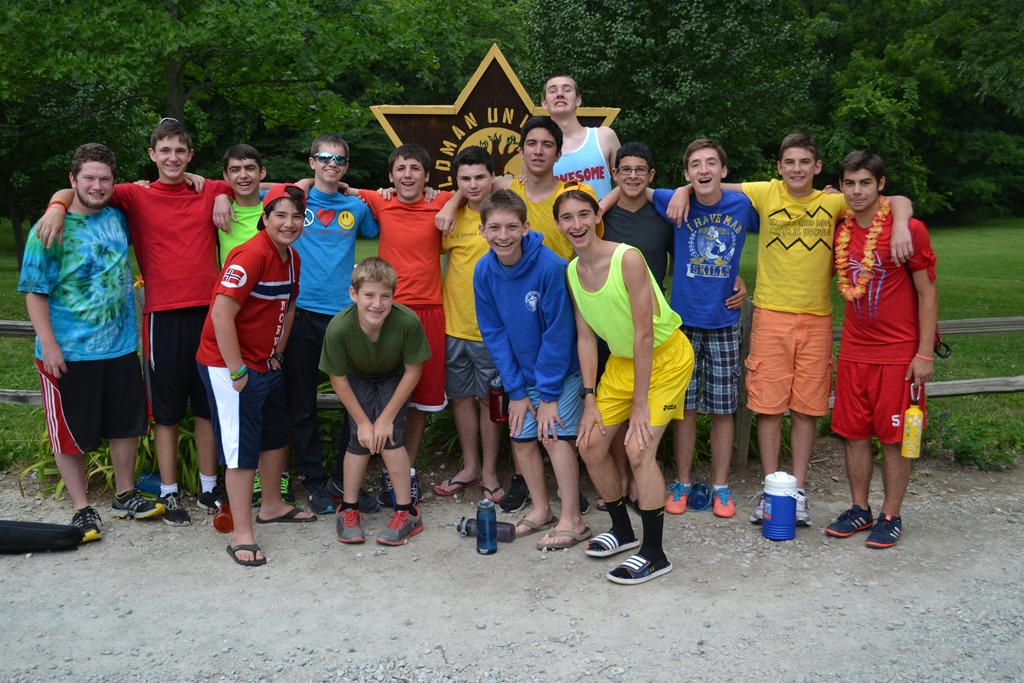
Service for July 13, 2014
Shalom! Almost every evening at camp, we have a different cabin lead T’fillot (services). Each camper writes a part and reads it before all of camp in between the prayers we say or sing as a community. This way, every camper gets the opportunity to share something of themselves with the wider camp, and to teach the community something about their values, Judaism, or their connection to our prayers. Our cabin services make each of our T’fillot that much more unique and meaningful. —Jacob Kraus, T’fillah Specialist
GUCI Evening Service
July 13, 2014
Cabin 17: Eye of the Beholder
Opening Song
For many people here at camp services are the least favorite part of the day. But, if you have a positive outlook on it, then it will be more meaningful. I believe this is the message the Bar’chu is trying to give to us: that if we have a positive outlook at the beginning of something you more likely to have a more enjoyable time. –Max Treen
Bar’chu
Everything is based on perspective. One thing that is talked about in the Ma’ariv Aravim is passage of time from day to night and night to day. Passage of time itself is also based perspective. To some people, a certain event, such as camp can go by fast if it’s enjoyed. To someone who doesn’t make the most of it, camp can be a less enjoyable experience for them. Whether it be camp or any other event, be sure to make the most out of anything you do. –Brandon Arnold
Ma’ariv Aravim
Ahavat Olam
For me, the Sh’ma is a prayer that I feel is connected to G-d. This is used to feel like just another prayer, but thanks to saying it 3 times a day at camp, it now has a special meaning to me. I say it knowing G-d is listening and nothing else matters except the communication between myself and G-d. Everyone connects differently to G-d and there is no right way. The only thing that matters is you feel the connection between you and G-d. –Jared Boehm
Sh’ma/V’ahavta
Seeing things from someone else’s perspective can be difficult and confusing. It is easy to get discouraged and simply revert back to focusing solely on your own opinions and point of view. But by embracing other people’s ideas, we open ourselves up to a whole new array of possibilities. This past year, I moved back to the United States. Bloomington, Illinois is a relatively small town, and it became clear to me that many living there had a vastly different perspective from mine. Here they were, many of them having traveled very little. There I was, never having resided in one place for more than four years. The beginning was rocky. But after accepting someone else’s beliefs I realized that it truly is all in the eye of the beholder. – Mitch Toher
A great trait that I think everyone should have or at least try is taking risks and trying things you normally wouldn’t do. This relates to me because just a few weeks before camp, I was with my cousin at the park and there was a big tree around the size of the migdal. I was scared to climb it at 1st, but after my cousin started climbing it, I knew that I would never know what it was like unless I try it. I really enjoyed it. Now, I am not saying you should go out and climb a giant tree, but you should definitely go out and try something new, like foods, countries, or even things you’re not use to. When you do something different, you will have the wisdom to enhance your range of skills. -Sammy Caruso
Mi Chamocha
As a lot of you may know, both of my parents are rabbis. However, some people think that just because I am a clergy kid, I know everything about Judaism and how synagogue works. For example, I’m always in the quiz bowl or yom sport and people ask me where the light switches are at my temple. Others insist that I should be a rabbi. “Grant, oh lord, our G-d, that we may lie down in peace and raise us up to a life renewed.” When I read this introductory line to the Hashkiveinu, it makes me think about my freedom and how every time we should and can be our own person, not as a stereotype. During the Hashkiveinu, think about what stereotypes you overcome each day. –Micah Kraus
Hashkiveinu
This past Mother’s Day, I was exiting a restaurant with my family, and I stumbled upon a rain-soaked picture of 4 people. No one had seen these people around the restaurant. At first glance, I looked and saw just a family; however, I later noticed that this picture showed a family tree in a way. There was a grandma, mom, daughter, and younger daughter all joined in a happy family reunion. Moments like this can be seen as unforgettable: just another family memory. Fortunately, I was able to see how lucky this family was. All members were smiling and having a good time. They were all blessed. During the Amidah, think about how blessed you are. Life will continue, and unfortunately tragedy will happen. For now, let’s just happily live in the moment and pray together as one community. –Ross Cohen
Two years ago, I chose to start wearing a tahillat katan and a kippah everyday. Many people’s initial reaction was, “What are those strings.” They never understood the purpose. Wearing these things connects us to our ancestors. The people who questioned my choices always stuck with one perspective and never looked at the situation differently. -Jacob Schwartzberg
Amidah (Avot V’Imahot, G’vurot, Kedushat Hashem)
Peace: a word with two meanings. Peace can be with yourself in a quiet place that sometimes requires yoga or meditation, but the peace that many of us are aspiring for is peace with our friends and family, peace in the world, and especially now, peace in Israel. I was lucky enough to have my Bar Mitzvah in Israel and I have a whole new appreciation for it now. People have different opinions on why there is strife there because of their different backgrounds and where they might live. It truly is in the eye of the beholder, or the way you see things. When I was in Israel, children played on the streets and the city smelled like Falafel and Shawarma. Let’s make sure it stays that way. – Greg Davidson
Shalom Rav
Perspective is very important in everyday life. It helps us understand why people say what they say. Most of us probably remember the government shut down. Had those politicians tried to understand the perspective of the other side, that wouldn’t have happened. Whether you’re the leader of the free world, or talking to a friend, perspective helps us all get along. I urge you all to remember the perspectives of others. It can only serve us well. -Michael Adato
Silent Prayer, Yih’yu L’ratzon
Every time I leave for Guci, my friends are baffled why I would ever choose to spend my summer here. They view Guci as almost a place of torture- no phone, no wifi, minimal air conditioning, and lots of what they say – “Jew stuff.” To me however, camp is my 2nd home. I get to spend 26 days a year with some of my best friends in the world. I don’t have to stress about things back at home, such as chores, and homework and making plans to hang out with friends. At camp, everything is centered around having an amazing time, and making friends and memories, which will last a lifetime. -Evan Jacobson
Aleinu L’shabeiach
The Mourner’s Kaddish is a prayer about remembrance. Certain people don’t care about the past millions of years ago or even 10 hours ago. But, remembering is the most important things to me. It reminds us of former mistakes, so we don’t repeat them. It lets us remember good times we had when we are sad. But, most of all it lets us retell the story of our ancestor for the younger generations. So, while saying the Kadish Yatom today, try to think of a good, sad, or even holy memory to you. -Cameron Schwartz
Mourner’s Kaddish
How do you behold prayer? It is a spiritual actuality, or is it physical? Is it an activity or a lifestyle? Prayer in my opinion is a lifestyle that helps you mend and keep strong your spiritual self. The reason that I believe that prayer shapes us is because, prayer can make us kinder, wiser, and spiritually strong. It affects our life and therefore is a lifestyle to me. How do you pray? -Tamir Rastetter
Closing Song
